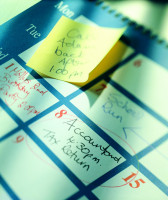The Simple Present tense
Use
You use the simple present in two situations:
1. You use it to say that something (usually an action) is a regular routine, event or a fact:
- You always have lunch at 12.30 pm.
- It always does that.
- You never tell us about your parents.
- He sometimes calls me "Honey".
- We usually go to the cinema on the weekend.
All these sentences have special adverbials of frequency like always, never, seldom, rarely, every day, every week, every month, every year, sometimes, usually, normally, regularly, etc. These words often appear with and are an indicator of the simple present!
Be careful with the position of the adverbial: it comes before a main verb like eat, have, like, meet, see, come, call, go, but after the verb "to be":
- He always comes late. BUT He is always late.
- She never calls me back. BUT She is never at home when I call her.
- They sometimes come over to our place. BUT We are never at their place.
Also, there is one more exception: adverbials with every like every morning, every night, every day, every week, every month, every year, every time, … are placed at the end of the sentence:
- We meet our friends every weekend.
- They have dinner at 6.30 pm every night.
- He eats breakfast at 8 o'clock every morning.
2. You use the simple present to talk about a fact or a state like feelings, likes and dislikes that are true for a longer period of time:
- We live in New York.
- He hates vegetables.
- I love you.
- My English teacher is very nice.
- She likes chocolate.
- The dog is 5 years old.
- Her name is Anna.
- They have two cats.
Take a look at the daily routine of the Fernandez family. Then complete the exercise below. Fill in the first gap with the correct day of the week. Then fill in the second gap with the simple present form of the verb (in brackets). For example: On ____ afternoon, she ___ (play) volleyball.  On Tuesday afternoon, she plays volleyball. To read again how to form the simple present, click here.
On Tuesday afternoon, she plays volleyball. To read again how to form the simple present, click here.
| Monday | Tuesday | Wednesday | Thursday |
| family breakfast at 7 am | Maria art class at 4 pm | Anna with her friends at 3 pm | Anna late school start at 10 am |
| school bus at 7.45 am | Pedro swims in the evening | Pedro's favourite TV show at 7 pm | family cinema at 8 pm |
Well done, you have finished learning the simple present.




